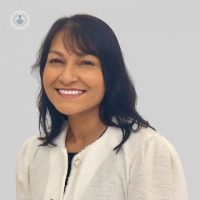The final bloom: what to expect during the menopausal process
Written in association with:Menopause is the inevitable end of the menstruation cycle that will happen to all women. Women approaching menopause will begin to exhibit symptoms that may be uncomfortable, but should not be cause to feel embarrassment. Menopause may have historically been talked about in hushed tones and private rooms, but today we chose to discuss it loudly and proudly. Dr Sandar Hlaing, who specialises in women’s medicine, walks us through the menopausal process, so that women won’t left in the dark when their time comes.

Before menopause
The perimenopause is the stage before the menopause starts in earnest. During the stage of perimenopause, you still get your periods, but they will be more irregular in timing and flow if they weren’t irregular previously. This is because the sexual hormones begin to be produced at abnormal levels. At this time, you will no longer be fertile as your eggs will begin to die off in a process called follicular atresia and be reabsorbed into the body. More symptoms that are common in menopause will start to manifest, as the transition into the actual menopause period. The length of the transition varies among women.
During menopause
You can only truly be in the menopause stage once your period stops entirely, and it may take a few months to a year to notice this. A blood test can confirm this, as it will be used to evaluate the levels of hormones in the body. Women in menopause will have greatly lower levels of oestrogen and progesterone, thus menopause is technically a type of hypogonadism. There are some hormones that increase in level, such as follicle-stimulating hormone (FSH) and luteinizing hormone, causing imbalance in the system, and this will lead to symptoms such as:
- Hot or cold flashes
- Joint pain
- Memory problems
- Excessive sweating
- Mood changes
- Sleep issues
- Fatigue
Women, on average, go through menopause between the ages of 45 to 55. Most women will cope with the symptoms during around seven years of menopause, but for those who are having very turbulent symptoms can look into treatments to alleviate them, such as hormone replacement therapy.
After menopause
As your body readjusts to the post-menopausal phase, which should be at least full year since your last period, life can continue as normal as the menopausal symptoms cease or lighten, but some things will need watching out for due to the reduction of oestrogen, such as:
- Osteoporosis, as bone density is reduced during menopause. Incorporating more calcium and vitamin D into your diet can help mitigate the risk
- Cardiovascular diseases, which increase in likelihood. Make sure you’re staying physically active and eating foods that aren’t high in saturated fats.
- Vaginal dryness (genitourinary syndrome), which can be alleviated with lubrication and creams. This can also be accompanied by incontinence due to a weakening of the pelvic muscles.
Your mental health may be impacted as well due to the dramatic change in your body, imbalanced hormones, and sadness and nostalgia over the last 30 or so years of that you were menstruating.
But a period is just that: a period. You’ll have entered an exciting new stage of your life and will be able to discover the world anew — perhaps in a pair of white trousers worn without apprehension!
If you are struggling with menopause or have further concerns regarding your menstrual cycle, Dr Sandar Hlaing is available for consultation via her Top Doctors profile


